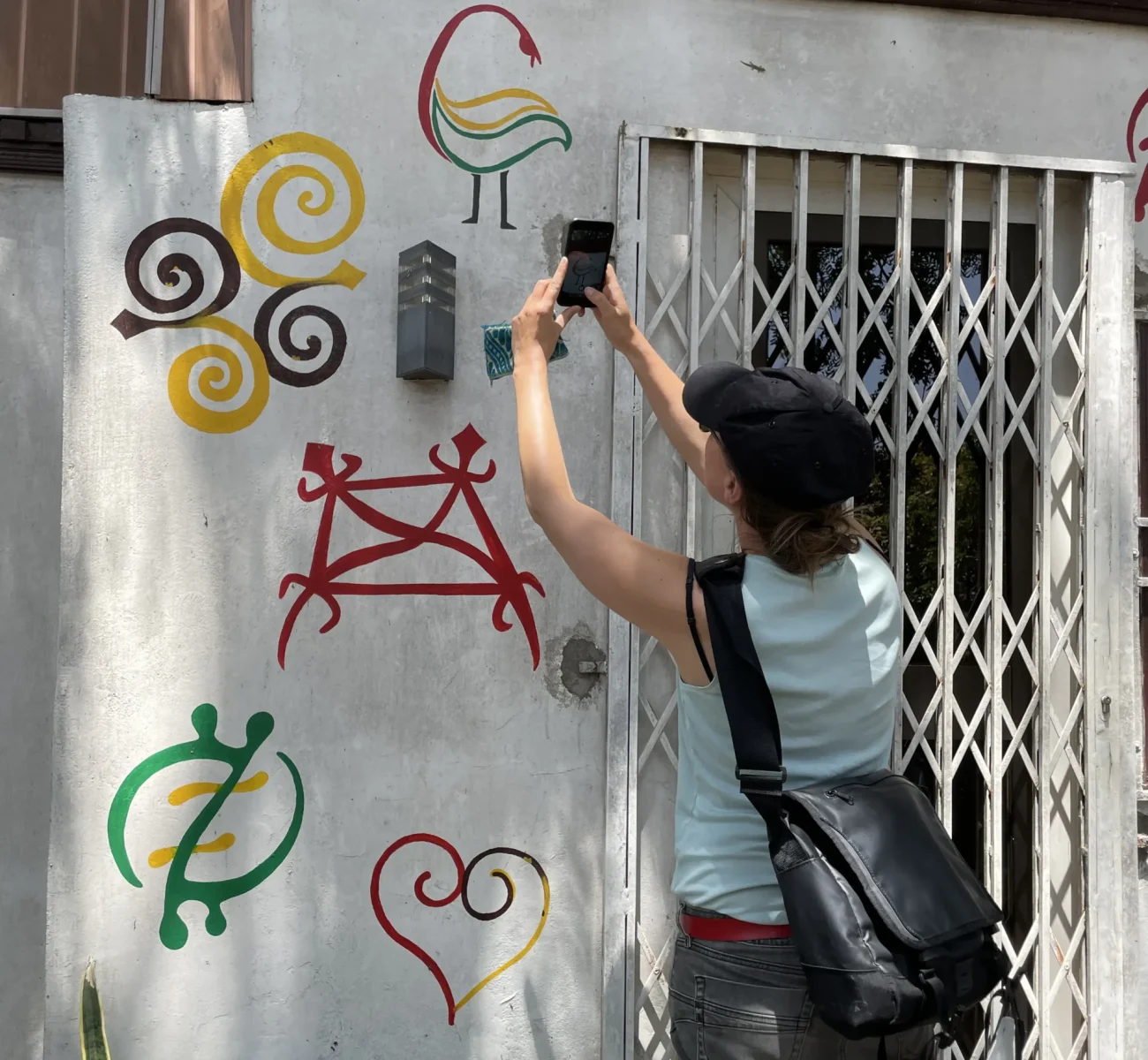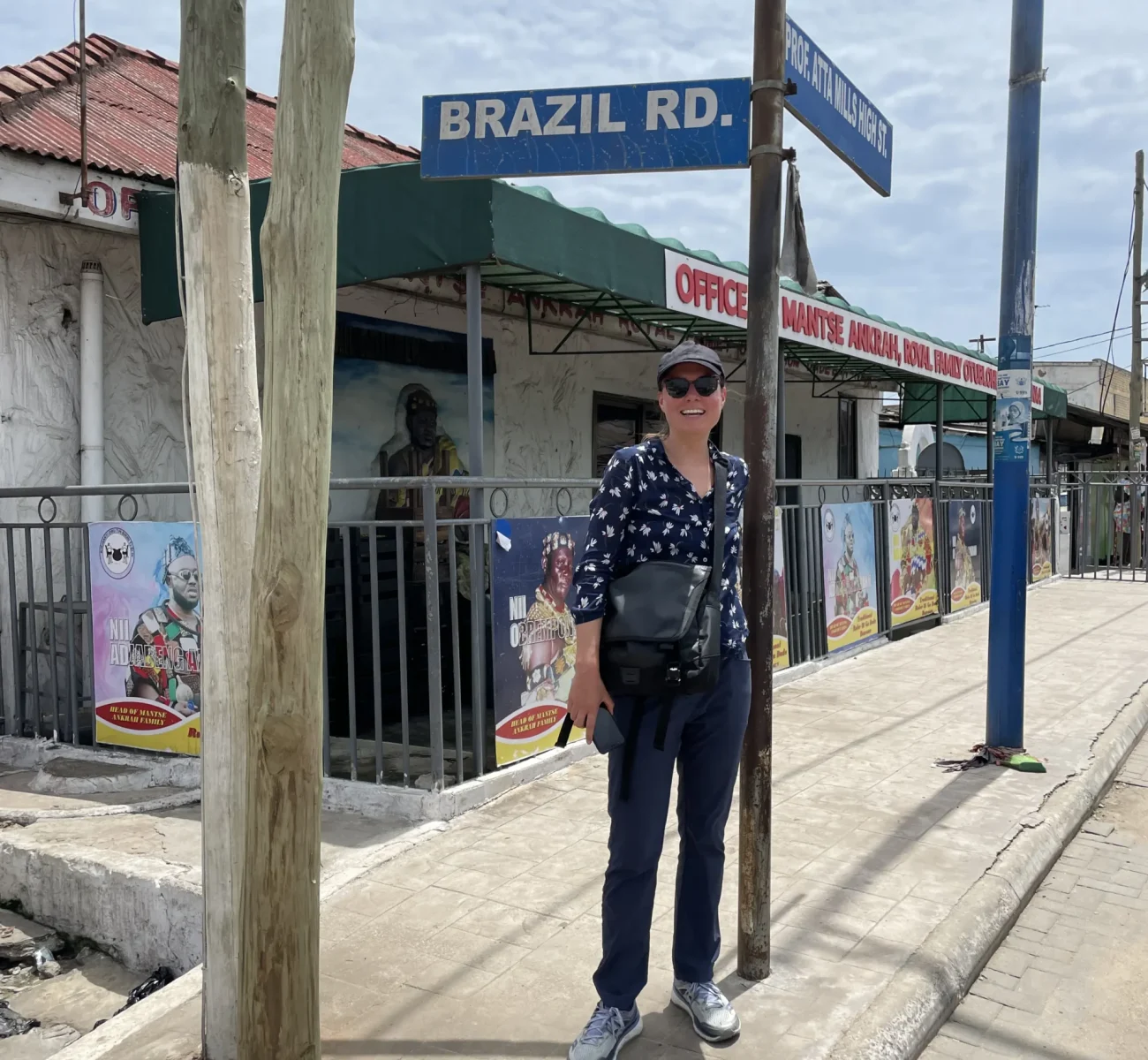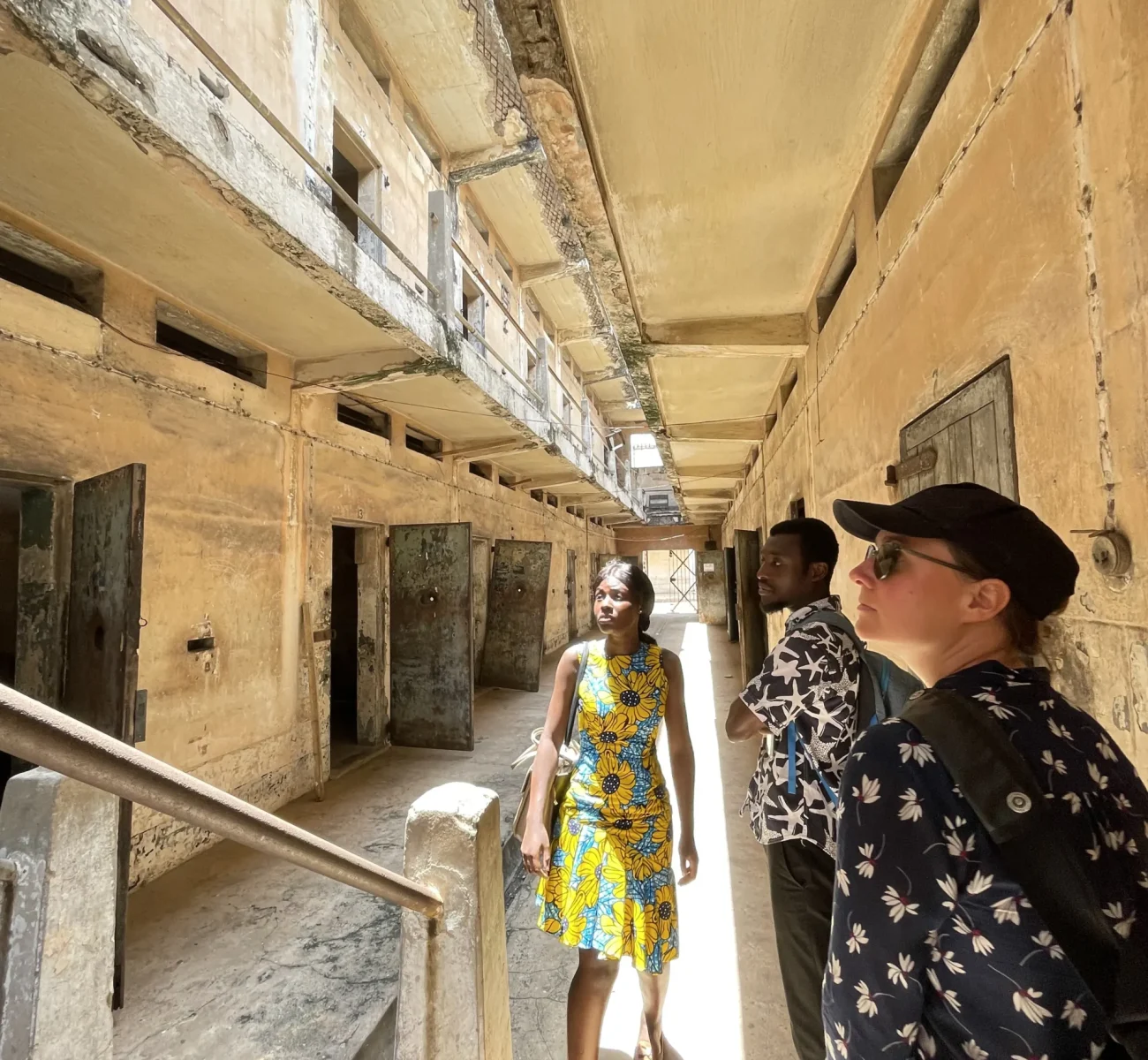Challenges and ambivalences of a global micro-sociology
The palm oil and spices, a white-clad priestess, the omnipresent Adinkra symbols[1]… the many connections and interrelationships between Ghana and Bahia, Brazil cannot be overlooked in the research project on collective memories of enslavement[2] I’m currently involved in. In the project, we do field work in different regions of Brazil and Ghana. The aim is to understand differences and similarities, as well as entanglements, between the two world regions and on a smaller level—like between northern and southern Ghana or between the Brazilian states of Bahia and Rio de Janeiro. How is the history of enslavement remembered and told? By whom? In which ways? Is the knowledge transmitted in families via religious and everyday practices, or rather in schoolbooks, or through monuments in public spaces?

African Influences (Salvador, Brazil): Bahian Food with Palm Oil. Copyright: Lucas Cé Sangalli.
But before I turn to the project and discuss some of the ambivalences and challenges of a Global Sociology with which it confronts me and my colleagues, I will briefly consider the question: what is Global Sociology? It is a sociology that requires us researchers to deal with our own positionalities and to look beyond our geographical and contextual horizon in all phases of the research process (from the first drafts and the application to the presentation of results), and on all levels (methodological, epistemological, practical) of the research. Global Sociology is “a pluralistic, multi-perspective social theory which takes non-Western societies seriously, not only as objects of sociological research and theory formation, but also—and especially—as sites of social-scientific knowledge production” (Randeria, 2001, p. 178), and it recognizes “research as a significant site of struggle between the interests and ways of knowing of the West and the interests and ways of resisting of the Other” (Tuhiwai Smith, 1999, p. 2). It aims to counter the “biases of Eurocentrism and Androcentrism” (Alatas & Sinha, 2017, p. 1). Furthermore, Global Sociology means—as Elísio Macamo argued during our first workshop (in presence, in Göttingen)—“resisting taking things for granted”[3]. It is a sociology that tries to explain global phenomena (like climate change, migration, the Covid-19 pandemic) and their effects on the daily life of people. Thus, it is a micro-sociology that looks at small-scale phenomena and compares them to similar—or very different—ones elsewhere in the world. Doing such empirical ground-level sociological research does not mean limiting ourselves to small scales. It just means using a bottom-up approach, or analyzing large-scale phenomena via analytical access to small-scale phenomena.

Adinkra Symbols (Accra, Ghana): The sankofa bird pictured above has been adopted as an important symbol in an African Diaspora context (among others in Brazil) to represent the need to reflect on the past to build a successful future. Copyright: Lucas Cé Sangalli.
Accordingly, in my work, following Norbert Elias (2001), I understand the micro-sociological level as being closely intertwined with the macro-level, and I am interested in their interdependence. Meticulous, micro-sociological investigations with methods appropriate to the subject matter are the basis for understanding the “bigger picture”. Consequently, I align my research concerns with Julian Go when he says, “I believe that the best postcolonial studies begin from the lived experiences of colonized subjects [. . .] we need social scientific postcolonial studies, alongside postcolonial studies in the humanities” (Boatcă et al., 2018, p. 433). Accordingly, I see my contribution to a Global Sociology in an empirically grounded and actor-centered analysis of historical processes, collective memories, and global entanglements. Without going into the details of our findings so far, I will use my ongoing research on collective memories of enslavement to discuss some of the challenges that I think a Global Sociology brings with it. I will address the following aspects:
1.) Actor’s perspective
2.) Historical context
3.) Sites of knowledge production
4.) Comparison
5.) Reflexivity in respect of one’s own role
6.) Collaboration
7.) Climate impact

Entanglements (Accra, Ghana): Brazil Road named after the former enslaved people who (re)migrated from Brazil to Ghana in the 19th century. Copyright: Lucas Cé Sangalli.
1.) Actor’s perspective: Anyone engaging with the legacy of slavery—or other comparable contexts—is confronted with the fact that history tends to be written by the perpetrators, with visual and textual testimonies of historical events mostly reflecting a racist, pejorative perspective. To learn about the perspectives of the ones affected by these processes through historical data is a challenge. The question of whose voices are (or can be) heard is a constant companion of our research process. Focusing on the perspective of those involved in, and affected by, social phenomena is a major goal and strength of interpretive methods and micro-sociological perspectives. However, it poses various challenges in the current project with its long-term historical perspective. There were projects in the 20th century where researchers were still able to speak with survivors of enslavement. The biographies written by the anthropologists Zora Neale Hurston (on Oluale Kossola, a.k.a. Cudjoe Lewis 2018) and Miguel Barnet (on Esteban Montejo 1977) are outstanding. These are very valuable contemporary testimonies. In our project, however, we do not work with these historical testimonies, but with people of the present. We talk to descendants—mainly of enslaved people, but also of people who were involved in the trade and exploitation of enslaved people. So, this project is decidedly not about what the concrete historical facts were, but about what is known by today’s generations, which perspectives there are on history, what role this history and these perspective play in people’s lives, and so on. As a biographical researcher who usually studies the biographical experiences of people and how they are remembered and presented in the present (of the interview) (cf. Rosenthal, 2006), I am learning that ‘remembering’ has a different meaning in this context. The people we’ve interviewed so far mostly speak about their experiences with collective memories and discourses and the respective conflicts. So, while this is a different way of remembering, perhaps in some cases more detached from the biographical experience, I still tend to use the term ‘remembering’ because I assume it emphasizes the practice, which is what I am most interested in.
It is enormously important, and a great strength of biographical research, to give space and priority to the relevances of the interviewees over one’s own interests or interests of the research project. However, the challenge often arises that it remains unclear which historical phases and events our interviewees are referring to, and to which historical events and experiences we should relate this knowledge. For example, during our research in northern Ghana, we found that Babatu, a warlord and notorious slave raider in the late 19th century (cf. Weiss, 2008, p. 121 ff.), was so present in the narratives of our interviewees that the question arose to what extent he occupies a proxy position in the telling of centuries of enslavement history. Thus, when it becomes clear that concrete historical experiences have not been passed on to current generations for various reasons, the question arises as to what function certain memories or discourses of memory have.
The point is to approach the following questions from the actor’s perspective: Which knowledge is transmitted, and which is not? What can be known at all, and is it “book knowledge” or incorporated knowledge? Which perspectives do today’s descendants of people who experienced enslavement have on these historical processes? There should be more research on the transgenerational transmission of enslavement experienced by relatives, and thus especially on the question of the transgenerational consequences for the descendants of enslaved people, but also of owners or traders of enslaved people.
2.) Historical context: The question of actor perspectives is closely related to the historical context. We have repeatedly found that our interviewees have a diffuse knowledge, which is mediated, for instance, through everyday family or religious contexts, or through music, while the concrete historical facts do not really play a role for them. As researchers, we are curious about which historical phases their statements refer to, but we have to live with the imprecision, or reconstruct the historical events and phases that are referred to latently.
In sociology, a social phenomenon must always be regarded as something that has become and is becoming (cf. Elias, 1987). The dangers of ahistorical thinking include: (1) mistaking phenomena that actually have a long history for new phenomena, (2) failing to recognize continuities, and (3) analyzing social phenomena as static. This is particularly true of Global Sociology for a variety of reasons.
In the case of our project, we are working on historically distant phases. Slavery was officially abolished in Brazil in 1888 (it was one of the last countries to do so), almost 150 years ago. And the first registered enslaved people were deported from Elmina, Ghana, in 1519. That is more than 500 years ago. This poses a number of challenges. First, the obvious one: we need to do a lot of historical research to be able to understand these long-term historical processes (at least to some extent). Second, we need (very good) contextual knowledge when dealing with social fields into which we have not been socialized, or when dealing with transregional processes. Third, there are always things we cannot grasp or understand. And fourth, we have to offer the reader or partner in the scientific dialogue an introduction to the respective historical and social context, which is not necessarily familiar to them. Although this may appear self-evident, I argue that it is a special challenge for Global Sociology, where research is not carried out and presented (mainly) in the context of a single nation state. This last aspect, which concerns above all the communication of our results, may become even more complicated if theoretical references are added which are not necessarily known in our scientific community.
3.) Sites of knowledge production: I constantly try to ask myself: What literature do I use? What theoretical references do I make? And I become aware again and again that German-language sociology strongly refers to, and tends to stay inside, its own nation-state “container” (see Beck 2000, p. 23ff.). This is reflected in the use of literature and theoretical references. A minimum standard for sociologists could be to quote authors from the regions of the world that they are writing about. However, this requires language skills. For example, while I am able to read and cite Portuguese and English literature, I cannot read texts in the indigenous languages of Ghana and Brazil. As the production of scientific texts mostly takes place in the languages introduced by the colonizers, this is not such a big problem in Brazil and Ghana. But when I was doing research in the Moroccan-Spanish border zone (cf. Bahl, 2021), my lack of knowledge of Arabic (and to a lesser extent Tamazight) closed my access to relevant research literature from a Moroccan perspective. The greater challenge is to access this literature from Germany. Open access formats are valuable for this, and I take a heavy suitcase full of books home with me every time I go on a research trip. In the long term, beyond this reception of locally produced literature, it is necessary to work toward ensuring that research in and from the Global South is not perceived as insignificant and regionally specific, while universally applicable theories emerge in “the West”. We need to start “provincializing Europe” (Chakrabarty, 2000). Reflecting upon my own sociological and theoretical socialization and its limits is related to a broader reflexivity in respect of my role in research and society.
4.) Reflexivity in respect of one’s own role: Referring to Simmel and Mannheim, Patricia Hill Collins (1986) discussed “the potential usefulness of identifying and using one’s own standpoint in conducting research” (p. 16). Depending on the research field, different positionalities and belongings become relevant. For me in my current research project, this is chiefly my position as a white European researcher whose ancestors may potentially[4] have been involved in slavery practices and/or colonial violence, and the fact that I am currently based at a German university. An interesting difference that has emerged is that this positionality of mine didn’t seem to play an explicit role in my research in Ghana, while it was very quickly “on the table”—and openly thematized by interview partners—while doing field work in Brazil. In Ghana, my positionality as a white European researcher was rarely openly addressed or questioned. In Brazil, on the other hand, a question that was often asked, especially in marginalized Quilombola communities, but also in a university where the majority of students saw themselves as Africans or of African descent, was: why are you white people doing this and what do we get out of it? The answer was never easy and always constituted a process of negotiation. Honesty also requires us to share our own interests, such as career building and ‘successful’ research. My assumption is that these different research experiences (among other components) are related to the difference between the two post-colonial societies: Brazil is a very diverse society with a strongly inherent racist hierarchy, while Ghana is a post-colonial nation state where the current elites are not of European descent. This kind of comparison can be very helpful in the research process.
5.) Comparison: In the project, we work with a permanent logic of comparison. We make comparisons between Ghana and Brazil, between Rio de Janeiro and Bahia, between northern and southern Ghana, and so on. This does not mean, however, that we assume that stable comparison parameters exist in the process. Rather, I argue (1) that comparison is a permanent sensitization to similarities and differences, to questions that should still be asked and facts that should still be researched; (2) the units of comparison are constructed by us as researchers: they arise from field work; and (3) as discussed above, they refer to our belongings as researchers and mutual attributions with the research subjects, since we are part of the field and comparison logic. We need to ask ourselves which ascriptions, which “we-” and “they-”images (cf. Elias, 1994) become relevant within the shifting power relations in our field. From a micro-sociological standpoint, we must ask which of these images are relevant for people who experience different social phenomena in their everyday lives, i.e., in their interactions with family members, with neighbors, or with ‘us’ as ‘researchers’. We do this by systematically comparing different cases within the units or groupings we discover in the field, and by carefully reconstructing the different ‘framings’ of interviews, group discussions and participant observation, based on the question: which cases might help us to understand more about a particular grouping and its figurations with others? As Jörg Niewöhner and Thomas Scheffer have pointed out, “objects of comparison are not found ‘out there’. They are not ready at hand. They are produced through thickening [analogously to Geertz’ thick description] contextualisations, including analytical, cross-contextual framings that are meant to facilitate comparison” (2010, p. 4). To give an example, although Rio de Janeiro is not part of our research project, visiting the museums and memorials there made us aware of how they were largely absent in Salvador and all of Bahia. And probably we wouldn’t have been aware in the same way of the common use of Adinkra symbols in theme-related cultural projects in Brazil (cf. Nascimento & Gá, 2022), of the similarities of food, religious clothing, and music (to name but a few) between Ghana and the Brazilian Northeast if we hadn’t gone to both places to look for these entanglements and differences.

Visiting Ussher Fort (Accra, Ghana) with our colleagues Ishmael Osei Boampong and Patricia Nyamekye from the University of Ghana. Copyright: Lucas Cé Sangalli.
6.) Collaboration: Above (see paragraph 4), I’ve already mentioned the question “what do we get out of it?” The subsequent negotiations often led to thinking about possible forms of cooperation. This leads me to the more general questions: With whom can I collaborate (inside and outside academia)? Who is involved in knowledge production? How can we overcome the structural inequalities in transnational research projects? The research discussed here is being conducted in cooperation with German(-based), Brazilian and Ghanaian researchers. Even if such a collaborative project is riddled with complex balances of power (related, among others, to unequal access to financial resources, international publishing platforms and travel for research and conference purposes), it leads to a broadening of horizons on both sides, and has the potential to make us aware of certain “blind spots” or presuppositions that are shaped by our respective contexts of socialization. In our case, the discussions often extend far beyond the project area: from religion and lifestyle to German migration policy and its connections with the labor shortage. But even the very banal observation by our Ghanaian colleague that he was perceived as a tourist guide when in our company at memorial sites was an enlightening insight for me. This attribution made him feel uncomfortable because he was ascribed a different social role, but above all he was seen as a competitor. The possibility and necessity of this kind of exchange and empathy with the perspectives of others, takes me to my last point.
7.) Climate impact: In their report on the restitution of African cultural assets, most of which were stolen in a colonial context, Felwine Sarr and Benedicte Savoy speak of a “new relational ethics” (2018) that must go beyond mere restitution. I think this logic can also be applied to the practice of Global Sociology: decolonization needs personal encounter and mutual understanding, critical self-reflection, openness to change and trust. The hurdles we face (or have faced) are, on the one hand, the pandemic travel restrictions or the visa policies of European authorities, which can make it difficult for colleagues from other continents to enter our country. On the other hand, flying between continents produces a clear dilemma for Global Sociology because the man-made climate change has led to an urgent need to curb such activities. “Academic mobility for field work, research dissemination and global outreach is increasingly recognized as an important contributor to the overall environmental footprint of research institutions” (Arsenault et al., 2019). I increasingly ask myself how this dilemma can be resolved. On the one hand, I always argue for an opening-up of sociology beyond its Eurocentric horizon, and I am incredibly enriched by fieldwork in Ghana and Brazil, and by my exchanges with colleagues from other continents. At the same time, I am concerned with the question of how a sociology that analyzes and criticizes global power inequalities can be organized in a way that contributes less to their amplification through climate change.
Conclusion: I’ve briefly discussed some challenges and ambivalences of empirical research in global contexts. All of them need to be, and will be, discussed further and more profoundly in our Research Network and in future publications. I’ve argued that a micro-sociological perspective can help us to explain global phenomena and their impact on people’s lives. In conclusion, one can say that with Global Sociology we try to do what every “good” sociology must do: we reflect upon our positionalities, we think about translation and perspectives, about how to understand each other, and about the impact and consequences of our work. We try to expand our sociological perspectives beyond nation-state and continental horizons which in turn confronts us with other dilemmas. During one of our first network meetings, Yvonne Berger said: Doing Global Sociology is a privilege! And we should be grateful to be able to practice it.
[1] Adinkra are symbols from the Akan Culture (based in today’s Ghana) that represent certain cultural concepts or mottos.
[2] The research project “Individual and collective memories of slavery and the slave trade: A contrastive comparison of different communities, generations and groupings in Ghana and Brazil” is led by Maria Pohn-Lauggas and Gabriele Rosenthal. Cooperation partners are Hermílio Santos (Pontifical Catholic University of Rio Grande do Sul; Porto Alegre, Brazil) and Steve Tonah (University of Ghana; Legon, Ghana). The project is funded by the German Research Foundation (DFG; PO 2422/3-1; RO 827/23-1) from 2022–2025.
[3] Quoted according to my minutes.
[4] I do not have any concrete knowledge of such an involvement.
Cite this article as: Bahl, E. (2023, September 19). Challenges and ambivalences of a global micro-sociology. Global Qualitative Sociology Network.
https://global-qualitative-sociology.net/2023/09/19/challenges-and-ambivalences-of-a-global-micro-sociology
References
Alatas, S. F., & Sinha, V. (2017). Introduction: Eurocentrism, androcentrism and sociological theory. In S. F. Alatas & V. Sinha (Eds.), Sociological theory beyond the canon. Palgrave Macmillan UK. https://doi.org/10.1057/978-1-137-41134-1
Arsenault, J., Talbot, J., Boustani, L., Gonzalès, R., & Manaugh, K. (2019). The environmental footprint of academic and student mobility in a large research-oriented university. Environmental Research Letters, 14(9), 095001. https://doi.org/10.1088/1748-9326/ab33e6
Barnet, M. (1977). Biografía de un Cimarrón. Centro editor de América Latina. https://omegalfa.es/downloadfile.php?file=libros/biografia-de-un-cimarron.pdf
Boatcă, M., Farzin, S., & Go, J. (2018). Postcolonialism and sociology: E-mail-debate. Soziologie, 47(4), 423–438.
Chakrabarty, D. (2000). Provincializing Europe: Postcolonial thought and historical difference. Princeton University Press.
Collins, P. H. (1986). Learning from the outsider within: The sociological significance of black feminist thought. Social Problems, 33(6), S14–S32. https://doi.org/10.2307/800672
Elias, N. (1987). The retreat of sociologists into the present. Theory, Culture & Society, 4(2–3), 223–247. https://doi.org/10.1177/026327687004002003
Elias, N. (1994). A theoretical essay on established and outsider relations. In The established and the outsiders: A sociological enquiry into community problems (2nd ed., pp. xv–lii). SAGE Publications.
Elias, N. (2001). The society of individuals (M. Schröter, Ed.; E. Jephcott, Trans.). Continuum.
Hurston, Z. N., Plant, D. G., & Walker, A. (2018). Barracoon: The story of the last “black cargo.” Amistad.
Nascimento, E. L., & Gá, L. C. (Eds.). (2022). Adinkra: Sabedoria em símbolos africanos (2nd ed.). Cobogó.




Leave a comment